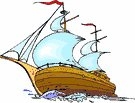By Brenda B. Covert

|
The Expository Essay
By Brenda B. Covert |

|
 |
Create Weekly Reading Books
Prepare for an entire week at once! |
| Leave your feedback on The Expository Essay (use this link if you found an error in the story) |
 |
Explorers
|
 |
Solar System
|
 |
Writing - Writing Prompts, Lessons, Activities, Poetry, and Daily Story Starters
|
 |
High School Reading Comprehensions and High School Reading Lessons
|
 |
Science
|
 |
Social Studies
|
|
|